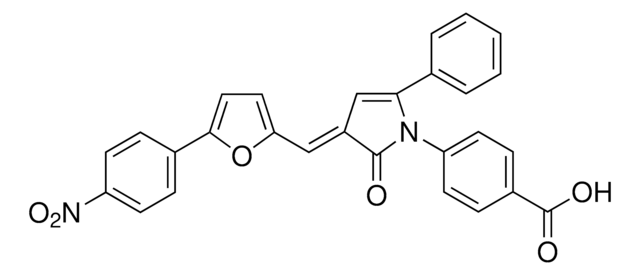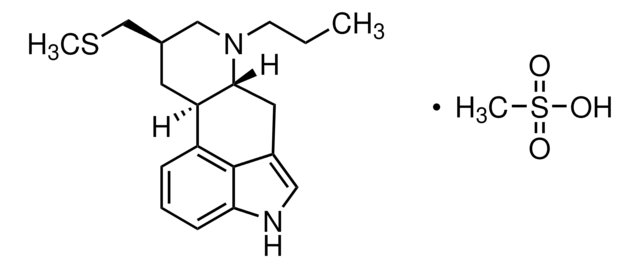SML0656
Rocaglamide
≥96% (HPLC)
Synonym(s):
(1R,2R,3S,3aR,8bS)-2,3,3a,8b-Tetrahydro-1,8b-dihydroxy-6,8-dimethoxy-3a-(4-methoxyphenyl)-N,N-dimethyl-3-phenyl-1H-cyclopenta[b]benzofuran-2-carboxamide, NSC 326408, Roc-A, Rocaglamide A
About This Item
Recommended Products
Assay
≥96% (HPLC)
form
film
color
colorless
shipped in
wet ice
storage temp.
−20°C
InChI
1S/C29H31NO7/c1-30(2)27(32)23-24(17-9-7-6-8-10-17)29(18-11-13-19(34-3)14-12-18)28(33,26(23)31)25-21(36-5)15-20(35-4)16-22(25)37-29/h6-16,23-24,26,31,33H,1-5H3/t23-,24-,26-,28+,29+/m1/s1
InChI key
DAPAQENNNINUPW-IDAMAFBJSA-N
General description
Application
Biochem/physiol Actions
Features and Benefits
Storage Class Code
11 - Combustible Solids
WGK
WGK 3
Flash Point(F)
Not applicable
Flash Point(C)
Not applicable
Certificates of Analysis (COA)
Search for Certificates of Analysis (COA) by entering the products Lot/Batch Number. Lot and Batch Numbers can be found on a product’s label following the words ‘Lot’ or ‘Batch’.
Already Own This Product?
Find documentation for the products that you have recently purchased in the Document Library.
Articles
The extracellular signal regulated kinase (ERK1 and ERK2) pathways are activated by mitogens and play an important role in controlling cell growth and differentiation.
The extracellular signal regulated kinase (ERK1 and ERK2) pathways are activated by mitogens and play an important role in controlling cell growth and differentiation.
The extracellular signal regulated kinase (ERK1 and ERK2) pathways are activated by mitogens and play an important role in controlling cell growth and differentiation.
The extracellular signal regulated kinase (ERK1 and ERK2) pathways are activated by mitogens and play an important role in controlling cell growth and differentiation.
Our team of scientists has experience in all areas of research including Life Science, Material Science, Chemical Synthesis, Chromatography, Analytical and many others.
Contact Technical Service







